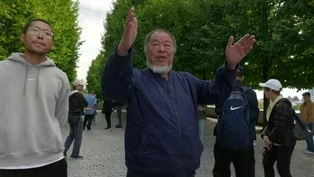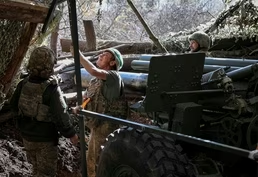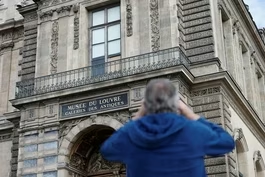
Rapidly thawing permafrost threatens remote Alaskan villages
Clip: 10/20/2025 | 6m 41sVideo has Closed Captions
Permafrost thawed by climate change threatens remote villages in Alaska
In the Arctic tundra of Alaska, climate change is forcing an Alaska Native village to relocate. Rising temperatures are melting the underground permafrost. The melted ice then mixes with the soil, creating unstable land the Yupʼik people call Alaskan quicksand. Amalia Huot-Marchand and a team from the Medill School of Journalism report.
Problems playing video? | Closed Captioning Feedback
Problems playing video? | Closed Captioning Feedback
Major corporate funding for the PBS News Hour is provided by BDO, BNSF, Consumer Cellular, American Cruise Lines, and Raymond James. Funding for the PBS NewsHour Weekend is provided by...

Rapidly thawing permafrost threatens remote Alaskan villages
Clip: 10/20/2025 | 6m 41sVideo has Closed Captions
In the Arctic tundra of Alaska, climate change is forcing an Alaska Native village to relocate. Rising temperatures are melting the underground permafrost. The melted ice then mixes with the soil, creating unstable land the Yupʼik people call Alaskan quicksand. Amalia Huot-Marchand and a team from the Medill School of Journalism report.
Problems playing video? | Closed Captioning Feedback
How to Watch PBS News Hour
PBS News Hour is available to stream on pbs.org and the free PBS App, available on iPhone, Apple TV, Android TV, Android smartphones, Amazon Fire TV, Amazon Fire Tablet, Roku, Samsung Smart TV, and Vizio.
Providing Support for PBS.org
Learn Moreabout PBS online sponsorshipAMNA NAWAZ: In the Arctic tundra of Alaska, climate change is forcing an Alaskan Native village to relocate.
Rising temperatures are melting the ice under the ground called permafrost.
The melted ice then mixes with the soil, creating unstable land.
The Yup'ik people call it Alaskan quicksand.
From Alaska, Amalia Huot-Marchand and a team from the Medill School of Journalism report.
EDNA CHASE, Resident of Nunapitchuk, Alaska: The houses, it's sinking.
Every year, my floor falls six inches all around the house.
AMALIA HUOT-MARCHAND: Edna Chase, 60 years old, lives in the Alaskan village of Nunapitchuk.
She's been in this home for 53 years, but now, due to rising temperatures, the permafrost underground is melting.
Her house is sinking in what they call Alaskan quicksand.
EDNA CHASE: There's no more foundation.
It's under the ground.
I have got three floors, two underwater, and the top one can't dry.
Sometimes, I have to have five fans going.
Man, it stinks in here.
AMALIA HUOT-MARCHAND: She has to pump the water from under her house every 15 minutes to keep it from flooding.
EDNA CHASE: Do you see the water?
AMALIA HUOT-MARCHAND: Seven hundred Yup'ik Natives call Nunapitchuk home.
Water is a major threat to village infrastructure, but it's also a part of daily life.
The village is divided into three islands by the Johnson River, where kids swim, people fish for subsistence, and the post office delivers packages by boat.
The melting permafrost affects every aspect of life here.
The only way to get around is walking on boardwalks, which are in constant need of repair.
Most infrastructure is severely damaged.
According to village authorities, the town and surrounding area will be uninhabitable within 10 to 15 years.
So residents voted to relocate to higher ground in 2023.
MORRIS ALEXIE, Resident of Nunapitchuk, Alaska: We are on the brink now.
AMALIA HUOT-MARCHAND: Morris Alexie is a Nunapitchuk resident leading the relocation efforts.
He took us to the new location by boat.
It's only three miles away, but at least 20 feet higher above sea level.
The village bought this land four years ago, and the more firm, stable land should allow buildings to last for centuries.
MORRIS ALEXIE: It would be a relief, for this, as you can see, high and dry over here.
AMALIA HUOT-MARCHAND: To move here, they need the support and financial assistance of the U.S.
government.
But bureaucratic hurdles have slowed this process.
MORRIS ALEXIE: With this new administration in the federal government, it seems like we were making some steps forward, and then this was like a step back again.
AMALIA HUOT-MARCHAND: A hundred and forty-three other villages in Alaska are imminently threatened by climate change, according to Permafrost Pathways.
It would cost more than $150 million to move Nunapitchuk.
But experts from Permafrost Pathways and the federal government say that coordination, not money, is the main stumbling block.
At least 15 different federal agencies play a part in the relocation process, with no leading authority to steer the efforts.
ALFREDO GOMEZ, U.S.
Government Accountability Office: It's a piecemeal approach, and it isn't working well.
AMALIA HUOT-MARCHAND: Alfredo Gomez is the director of the natural resources and environment team of the U.S.
Government Accountability Office.
ALFREDO GOMEZ: Our recommendations are that a federal entity, if it's going to be the federal government, needs to sort of be in charge of coordinating and helping the communities make those moves.
AMALIA HUOT-MARCHAND: C.J.
McCormick is a lifelong resident of Bethel, the closest city to Nunapitchuk.
He represented the 38th District of Alaska in the state legislature for two years.
FMR.
STATE REP.
C.J.
MCCORMICK (D-AK): There are solutions to these problems that are being ignored because of bureaucracy or just almost willful ignorance, to be frank.
AMALIA HUOT-MARCHAND: During his term, he says he saw strong political pushback towards climate relocation.
FMR.
STATE REP.
C.J.
MCCORMICK: I don't think it's a tenable situation to tell someone just to leave.
You're telling them essentially to just give up their culture and give up their ancestry and things like that.
AMALIA HUOT-MARCHAND: Relocation is even more urgent because the melting permafrost has created severe health issues for many Nunapitchuk residents.
According to Morris Alexie the banks of the sewage lagoon and the dump site are eroding.
Remnants of wastewater are seeping into the river.
MORRIS ALEXIE: Our dump sites, our lagoon, they are all upstream of the river.
It's not good for our health right here.
AMALIA HUOT-MARCHAND: The damaged homes are also allowing cold winds in, creating a damp, frigid environment that lets severe mold develop.
As a result, many residents, including Edna's 15-year-old son, have developed chronic respiratory diseases.
EDNA CHASE: My son started using an inhaler.
And his dad, who used to live here, uses a nebulizer.
AMALIA HUOT-MARCHAND: If there is no federal or international action on climate change, scientists project that village temperatures will rise by nearly 15 degrees Fahrenheit by the end of the century.
At that point, there will be no solid ground in Nunapitchuk.
MORRIS ALEXIE: But as you can see, I would probably be really stuck if I was alone in there.
AMALIA HUOT-MARCHAND: Edna Chase says the federal government has no idea of the conditions that she and the village are living in.
EDNA CHASE: Washington, D.C., you guys should come and look at it firsthand with your own eyes.
You come and smell each house.
You will smell the stench.
You will see green mold, black mold all over.
How could you live with that?
AMALIA HUOT-MARCHAND: For the people of Nunapitchuk, including Morris Alexie, moving to the nearest town, Bethel, is not an option.
MORRIS ALEXIE: What we want to preserve is the way of life we have known since time beginning.
AMALIA HUOT-MARCHAND: But whether the Yup'ik people in Nunapitchuk will manage to relocate before their village sinks will depend on how fast temperatures rise and what assistance they can get from the federal government.
For "PBS News Hour," I'm Amalia Huot-Marchand with the Medill School of Journalism in Nunapitchuk, Alaska.
Ai Weiwei’s ‘Camouflage’ reflects on FDR’s Four Freedoms
Video has Closed Captions
Clip: 10/20/2025 | 7m 57s | Ai Weiwei’s ‘Camouflage’ art installation reflects on FDR’s Four Freedoms (7m 57s)
How Europe responded to Trump urging Ukraine to cede land
Video has Closed Captions
Clip: 10/20/2025 | 5m 54s | How European leaders are responding as Trump urges Ukraine to cede territory to Russia (5m 54s)
How GOP-led redistricting may disenfranchise Black voters
Video has Closed Captions
Clip: 10/20/2025 | 6m 54s | How GOP-led redistricting efforts may disenfranchise Black voters (6m 54s)
News Wrap: Louvre closed as investigators hunt for thieves
Video has Closed Captions
Clip: 10/20/2025 | 6m 55s | News Wrap: Louvre closed as investigators hunt for jewel thieves (6m 55s)
Tamara Keith and Amy Walter on protests against Trump
Video has Closed Captions
Clip: 10/20/2025 | 8m 52s | Tamara Keith and Amy Walter on millions protesting against Trump’s agenda (8m 52s)
Trump clashes with Colombian president over boat strikes
Video has Closed Captions
Clip: 10/20/2025 | 7m 48s | Trump clashes with Colombian president over Caribbean boat strikes (7m 48s)
Providing Support for PBS.org
Learn Moreabout PBS online sponsorship
- News and Public Affairs

FRONTLINE is investigative journalism that questions, explains and changes our world.

- News and Public Affairs

Amanpour and Company features conversations with leaders and decision makers.












Support for PBS provided by:
Major corporate funding for the PBS News Hour is provided by BDO, BNSF, Consumer Cellular, American Cruise Lines, and Raymond James. Funding for the PBS NewsHour Weekend is provided by...





